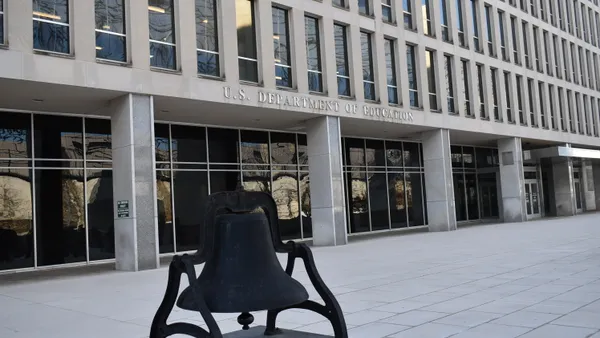Dive Brief:
- Two-thirds (65%) of Americans are unsatisfied with U.S. higher education, according to an annual survey of more than 2,000 adults from New America, a left-leaning think tank, marking a decrease from 2018 (72%).
- About half (51%) of Americans say getting a high-quality education after high school is unaffordable, and roughly four in five say the federal and state governments should allocate more funding to higher education to make it more accessible.
- Around two-thirds of Americans say colleges should lose access to government funding if their students have high default rates, and three-fourths said the same of institutions whose graduates struggle to earn a living wage.
Dive Insight:
Only about one-third of adults said U.S. higher education was "fine how it is," though their responses mark a small increase over previous years' findings. In 2018, just 27% of respondents were satisfied with the sector.
Other polls have found a similar lack of trust in American higher education.
A 2018 Gallup poll, for instance, found that around half (48%) of respondents had "a great deal" or "quite a lot" of confidence in the sector, down from 57% who said the same three years prior. Much of that decline is attributable to Republicans, whose reported confidence in the sector fell 17% from 2015 to 2018.
"Everyone felt great about American higher education for a long time," said Kevin Carey, New America's vice president of education policy and knowledge management, at an event Tuesday in Washington discussing the results of New America's survey. "It's clear now that the public is not entirely content with our higher education system."
Meanwhile, nearly two-thirds (62%) of Americans believe there are "lots of well-paying, stable jobs" for those who only have a high school degree, the survey found. That's up from 50% of Americans who said the same in 2018.
However, that belief may be at odds with the jobs available in the U.S. The number of "good jobs" — or those that pay at least $35,000 for younger workers and $45,000 for older workers — available to people with only a high school diploma has been declining, according to a 2018 report from Georgetown University's Center on Education and the Workforce.
New America's report noted differing opinions based on how respondents identified politically. For example, half of Democrats agreed that a high school degree could lead to a well-paying job, compared to around three-fourths (76%) of Republicans.
That could be attributable to a growing political divide in America. "We see cultural issues, particularly around speech and freedom of expression being refracted through how we see our colleges and universities," Carey said.
The public's view on such issues will be increasingly important, he added, as higher education funding becomes a central presidential campaign issue.
Several Democratic contenders have voiced their support for free college and debt forgiveness, and President Donald Trump earlier this year signed an executive order tying research funding to college's ability to protect students' right to free speech.














